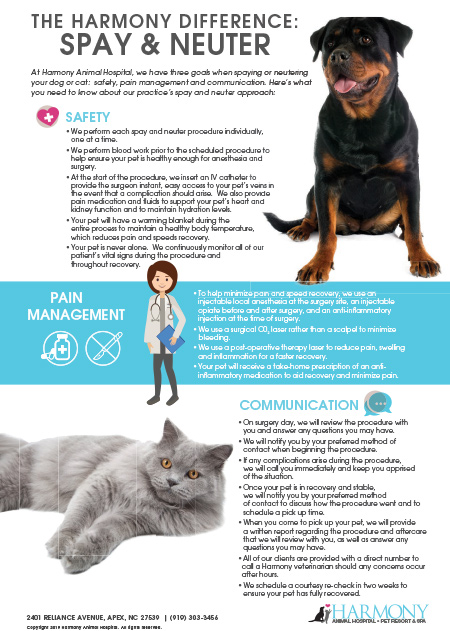Spay and Neuter – Cats
Male cats are fundamentally different than male dogs, and so different guidelines apply to neutering decisions for them. Unlike dogs, male cats are not large enough to develop growth plate issues if they are neutered during the first year of life. At Harmony Animal Hospital, we recommend that you neuter your male cat between 6 and 8 months of age.
Neutering your male cat will help limit the pet population and keep some very undesirable behaviors under control. Some of the downsides of having a male cat that is not neutered include:
- Aggression toward other cats (inter-cat aggression). Unneutered male cats are often more aggressive toward other cats than those who are neutered
- Aggression toward people. Intact male cats can become aggressive toward people
- Marking and inappropriate urination in the home. Male cats use urine as a form of communication to females. The way they see it, marking the home with urine is a way of telling female cats that there’s a male around. Even if you do not have female cats, an unneutered male cat will likely urinate on things to convey that your home is his domain
- The aroma of male cat urine. It becomes unbearable around 7 to 12 months of age when the cat reaches sexual maturity

Spaying Female Cats
Like male cats, Harmony Animal Hospital recommends spaying female cats between 6 and 8 months of age. The trick is to get your female cat spayed before she first comes into heat. Here are some of the disadvantages of waiting too long to spay your female cat:
- In-heat females have prolonged heat cycles. Once a female cat comes into heat, she can only come out of heat by being bred
- Irritating and loud behavior. While in heat, female cats are extremely vocal and annoyingly affectionate at all times. Female cats in heat also scratch doors, rub on everything, mark the home with urine, and howl loudly
- Higher risk of mammary cancer. Failing to spay a female cat leads to a greater risk of mammary cancer, which is often aggressive and life-threatening.
- Reduced risk of pyometra. Just like in female dogs, this is a uterine infection that can make your cat very ill. It can be life-threatening, and the risk is eliminated by spaying your cat.



